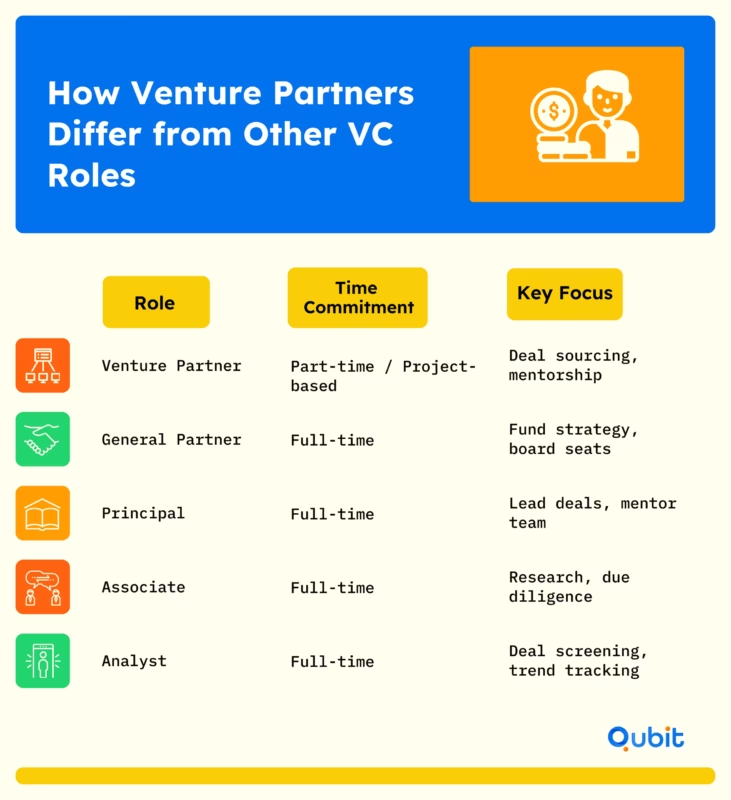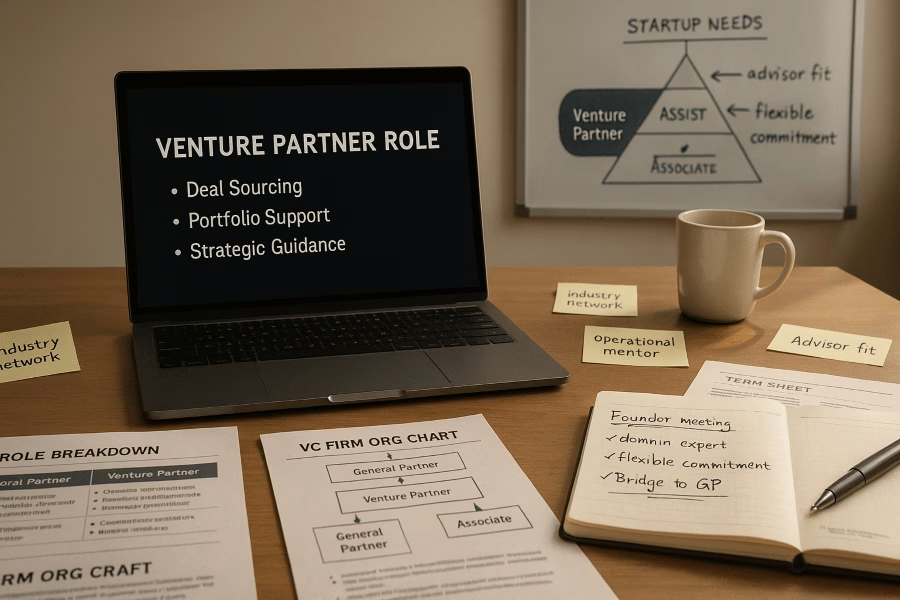Did you know that more than 42% of team-led venture funds are now led or co-led by women among new and emerging managers? Venture Partners play a flexible and strategic role. They step in at critical growth stages to connect startups with the right resources. In this post, we’ll define the Venture Partner role, compare it with associates, principals, and general partners, explore common compensation structures, and even walk through a typical day in the life.
Whether you’re a founder deciding which type of investor to bring on board or a professional exploring this role, you’ll gain actionable insights here.
Let’s explore the pivotal role of venture partners, their responsibilities, and how they can transform a startup’s journey toward success.
Venture Partner Definition and Key Responsibilities
A venture partner plays a unique role, offering flexible, part-time, or project-based contributions. Unlike General Partners (GPs) or Limited Partners (LPs), they are less formally involved. This allows them to focus on specific areas such as deal sourcing, strategic guidance, and mentoring portfolio companies. This flexibility makes venture capitalists valuable assets for VC firms seeking specialized expertise without requiring full-time commitment.
Their responsibilities often include identifying promising startups, providing strategic mentorship to founders, and supporting portfolio companies in scaling operations. While they may not hold decision-making authority like GPs, venture partners are instrumental in shaping investment strategies and ensuring the success of the firm’s investments. Compensation structures for venture partners vary, typically involving a mix of fees and equity stakes tied to the deals they help secure.
The role of a VC particularly appeals to seasoned entrepreneurs or industry experts who wish to contribute their knowledge without the demands of a full-time VC partner position. By bridging the gap between operational expertise and investment acumen, venture partners enhance the overall effectiveness of venture capital firms, making them indispensable in the dynamic world of partner venture capital.
How Venture Partners Differ from Other VC Roles
Venture partners occupy a unique niche in the partner venture capital ecosystem. While they may not carry the full legal liability of General Partners or oversee firmwide strategy like Managing Partners, they inject specialized expertise and network access right where it counts.

General Partner Responsibilities
General Partners steer high-level decisions, setting fund strategy, approving investments, and often taking board seats. With full liability and a share of carried interest at stake, GPs drive fundraising and manage relationships with Limited Partners.
Managing Partner Responsibilities
Managing Partners oversee the entire firm, from setting long-term vision to supervising operations and compliance. They balance portfolio performance with firm governance, ensuring that every team member, including venture partners—aligns with the fund’s goals.
Principal Responsibilities vs. Venture Partners
Principals bridge senior leadership and deal teams. They source deals, lead term-sheet negotiations, and mentor Associates. Unlike venture partners, Principals are typically full-time employees with clear paths toward GP promotion.
Associate Role in Venture Capital
Associates dive deep into market research, financial modeling, and due diligence. They prepare investment memos and coordinate with Analysts to build the data backbone that supports investment decisions.
Analyst Contributions in Venture Capital
Analysts screen deal flow, track emerging trends, and maintain databases of potential targets. Their work sharpens the fund’s competitive edge,critical when only 6–12 percent of venture capitalists achieve ‘successful’ returns .
A venture partner, by contrast, engages on a project basis, leading thematic investment drives, supporting portfolio companies, or anchoring strategic partnerships.
Together, these roles form a layered team where venture partners add flexibility, targeted expertise, and hands-on support without the full operational burden of a GP.
How Venture Partners Are Compensated
Venture partners receive compensation that rewards both their expertise and performance. Typically, it combines a modest base salary with profit-sharing incentives, known as carry. This hybrid model reflects the critical role venture partners play in sourcing deals and driving returns for the firm.
The average venture partner salary in 2024 stands at $300,332, reflecting a slight adjustment in compensation trends. This figure serves as a benchmark for negotiating compensation packages, especially for professionals entering or advancing in the venture capital space. Firm size, sector expertise, and geographic location significantly influence pay scales. For instance, firms focusing on high-growth sectors like SaaS or biotech often offer more competitive packages due to the specialized knowledge required.
Market conditions also play a pivotal role in shaping compensation. During periods of economic growth, venture partners may see higher bonuses tied to successful investments. Conversely, in challenging market environments, firms may adjust base salaries or carry structures to align with reduced deal flow.
For those exploring alternative funding avenues, the explanation of government-backed investment programs startups adds depth to your knowledge of funding sources that operate alongside venture partner arrangements.
Ultimately, the flexibility of venture partner compensation models ensures alignment between individual contributions and firm-wide success, making it an attractive career path for seasoned professionals in venture capital.
What Does a Typical Day Look Like for a Venture Partner?
A venture partner’s day is a dynamic blend of strategic planning, industry engagement, and collaborative problem-solving. Their role demands adaptability, as they balance responsibilities across multiple domains within a venture capital firm. Here what you can know about their schedule:
Morning Priorities: Setting the Tone
The day often begins with reviewing market trends and assessing potential investment opportunities. With the US VC market projected to reach $2.64T by 2032 (8.17% CAGR), staying informed about emerging sectors is crucial for identifying promising deals. Venture partners may also dedicate time to refining strategies for portfolio companies, ensuring alignment with broader firm objectives.
Midday: Mentorship and Collaboration
A significant portion of the day involves mentoring portfolio companies. Whether guiding startups through operational challenges or brainstorming growth strategies, venture partners play a hands-on role in fostering success. For example, the Airtree Case highlights how active venture partner involvement can drive transformation within portfolio companies. These interactions often extend to internal meetings with investment teams, where venture partners provide insights on deal flow and strategic direction.
Afternoon: Networking and Industry Engagement
Networking is a cornerstone of the venture partner role. From attending industry events to connecting with founders and other investors, these activities help build relationships that fuel future opportunities. Additionally, venture partners may focus on compliance considerations, especially when working with international or large-scale funds. A review of legal issues with sovereign investments offers valuable insights into the regulatory landscape that can impact daily operations.
Staying Ahead of Trends
Throughout the day, venture partners stay attuned to industry shifts, ensuring they are prepared to act on emerging opportunities. Their flexible schedule allows them to engage at multiple levels, driving both immediate and long-term impact within the firm.
Breaking Down Key Venture Capital Terms
VC terminology is crucial for anyone exploring this dynamic field. Terms like limited partner, angel investor, and seed investor often overlap but represent distinct roles. A limited partner typically provides capital to a venture fund without direct involvement in decision-making. In contrast, an angel investor independently funds early-stage startups, often offering mentorship alongside financial support. Meanwhile, a seed investor focuses on funding startups during their initial growth phase.
A venture partner stands apart by actively contributing to deal sourcing and portfolio management, bridging the gap between passive investors and operational roles. This unique position highlights their pivotal role in venture capital ecosystems.
Why Venture Partners Are Valuable for Startups
Startups often face a unique challenge: bridging the gap between capital infusion and operational expertise. This is where a venture partner becomes indispensable. Unlike full-time venture capital staff, venture partners bring specialized, high-level insights tailored to the startup’s industry and growth stage.
Their deep industry expertise allows them to address specific operational hurdles, guiding startups toward scalable solutions. Furthermore, venture partners often possess extensive networks, opening doors to strategic partnerships, talent acquisition, and market opportunities that accelerate growth.
By acting as a bridge between financial resources and operational needs, venture partners ensure startups can focus on refining their product, expanding their market presence, and achieving sustainable growth. Their role is not just advisory but transformative, helping startups position themselves competitively in their respective industries.
The Five Types of Venture Partners You Should Know
Understanding the different types of venture partners can be a game-changer for startups seeking tailored support. Venture partners typically fall into five distinct categories, each offering unique expertise and engagement styles.
Deal Sourcing Partners: These individuals excel at identifying promising investment opportunities. Their extensive networks and sharp analytical skills make them invaluable for startups aiming to secure funding.
Operationally Focused Partners: Known for their hands-on approach, these partners dive deep into the operational aspects of a business, helping startups optimize processes and scale effectively.
Part-Time/Advisory Partners: Offering flexible involvement, these partners provide strategic advice without full-time commitment, ideal for startups needing occasional guidance.
Domain Experts: Specialists in specific industries, domain experts bring niche knowledge that can help startups navigate complex markets.
Connector Partners: These partners thrive on building relationships, connecting startups with key players in venture capital and beyond.
What Makes a Venture Partner Successful?
The success of a venture partner hinges on a blend of personal and professional qualities that drive impactful results. Deep industry expertise allows them to identify opportunities and provide strategic guidance tailored to the unique needs of startups. Their robust networks open doors to valuable connections, fostering growth and collaboration within the entrepreneurial ecosystem.
Adaptability is another hallmark of high-performing venture partners. They thrive in dynamic environments, addressing challenges with innovative solutions while maintaining unwavering integrity. Additionally, their ability to mediate conflicts ensures smooth operations and strengthens relationships among stakeholders.
Mentorship plays a pivotal role in their effectiveness. Successful venture partners offer hands-on support, sharing insights and fostering skills that empower startups to scale. These attributes collectively define the venture partner job description and underscore their significance in the VC landscape.
Conclusion
Venture Partner role is crucial for startups aiming to collaborate effectively with venture capital firms. From managing key responsibilities like sourcing deals and mentoring portfolio companies to navigating compensation structures, Venture Partners play a pivotal role in shaping the operational and strategic outcomes of VC-backed ventures. Their day-to-day impact often bridges the gap between startups and investors, fostering growth and innovation.
By grasping these dynamics, startups can better position themselves to attract and engage with the right investors, ensuring alignment with their growth objectives. Whether you’re seeking insights into the VC ecosystem or aiming to refine your investor outreach strategy, Qubit Capital offers tailored solutions to support your journey.
If you’re aiming to connect with the right investors, our Investor Discovery and Mapping Services can help you identify the perfect match for your startup’s growth journey. Let’s get started together.
Key Takeaways
- Venture Partners provide specialized expertise on a flexible, often part-time basis, focusing on deal sourcing, strategic mentorship, and portfolio support without the full liability of a General Partner.
- You can lean on Venture Partners for agile, high-impact help that plugs operational gaps your team can’t fill with full-time staff.
- Their remit blends board-level strategy with roll-up-your-sleeves execution, setting them apart from Managing or Associate partners who sit mainly on one side of that divide.
- Expect pay structures that start with a modest retainer or salary, then scale through carry slices, bonus pools, or deal-level success fees tied directly to value they unlock.
- A normal day might see them dissecting new markets before breakfast, courting co-investors at lunch, and mentoring portfolio founders on hiring sprints well into the evening.
- Before you choose one, map the flavours—sector specialist, operator-turned-advisor, rainmaker—and vet qualities like network strength, follow-through, and cultural fit to land expertise that really moves the needle.
Frequently asked Questions
What is a Venture Partner?
A Venture Partner is a professional within a venture capital firm who provides strategic guidance, sources deals, and offers operational support. They work flexibly, often focusing on specific areas of expertise, and play a crucial role in mentoring startups and advising on critical decisions. The average Venture Partner salary in the US is $300,332, with bonuses representing 9.08% of their salary.






